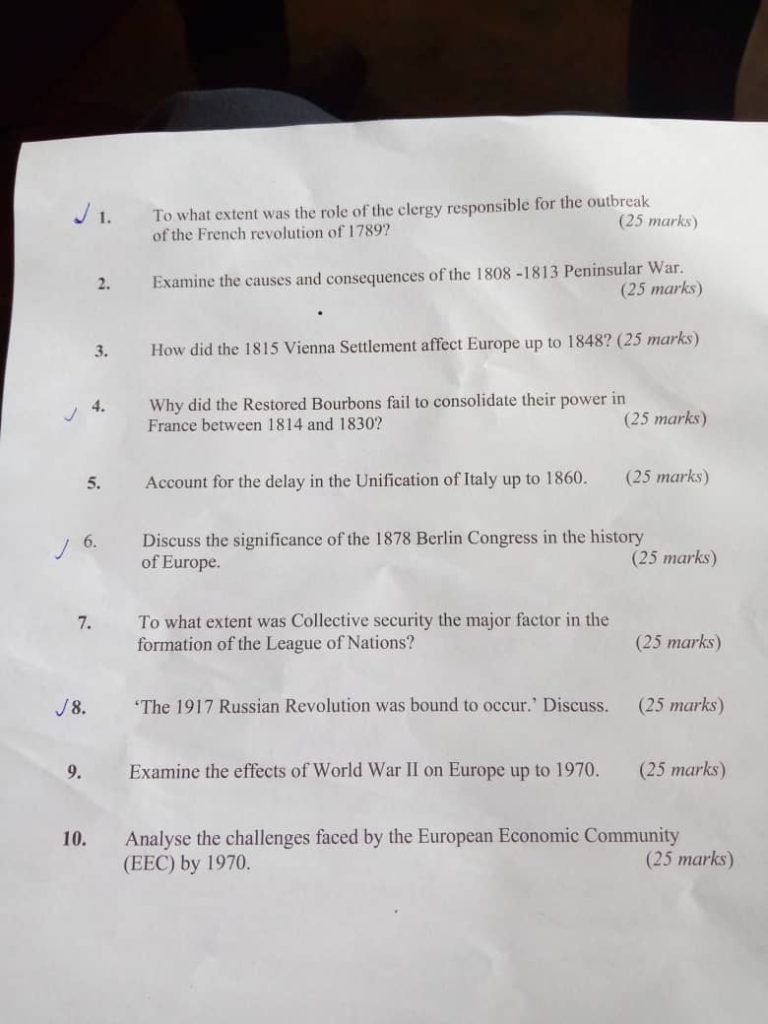Uganda, like many African nations, finds itself at a critical juncture in its educational journey. The recent Uganda Advanced Certificate of Education (UACE) examination questions in history illuminate a longstanding concern: the overwhelming emphasis on European and global history, seemingly at the expense of understanding our own rich heritage. As students grapple with questions on the French Revolution, the Peninsular War, and the Vienna Settlement, one must question the relevance of such content in shaping the minds of young Ugandans.

While it is essential for students to have a global perspective, the current emphasis on European and American history in the Ugandan curriculum raises pertinent questions about the imbalance in educational priorities. Why are our students dedicating a significant portion of their academic careers to dissecting the intricacies of the 1808-1813 Peninsular War, while our own history, culture, and struggles remain relegated to the periphery?
Uganda boasts a rich tapestry of history, from the pre-colonial era through the struggles for independence to the challenges and triumphs of the present day. Yet, our educational system seems to downplay the significance of this narrative, focusing instead on the exploits of distant lands and bygone eras. As Ugandans, our students deserve an education that instills pride in their heritage, fostering a sense of identity that extends beyond the confines of European history textbooks.
By perpetuating a curriculum that disproportionately prioritizes European history, we risk creating a generation of Ugandans with a limited understanding of their own roots. This disconnect has far-reaching consequences, not only for national unity but also for the ability to navigate the complex socio-political landscape that defines Uganda today. To build a resilient and empowered citizenry, we must redirect our educational focus to include a comprehensive understanding of our own history and its implications for the present and future.
It is time for a reevaluation of Uganda’s educational priorities. We must strike a balance between global awareness and a thorough understanding of our local context. This does not entail abandoning the study of world history but rather integrating it into a broader curriculum that places equal emphasis on Uganda’s past, present, and future. Curriculum reform should strive to cultivate critical thinking, problem-solving, and a deep appreciation for our own cultural diversity.
Let Us Build Your Online Success!
We are the experts in creating visually stunning and functional websites. With reliable hosting and exceptional customer support, we bring your vision to life. Join hundreds of happy clients who trust us!
Get Started Now📞 Call/WhatsApp: +256 207 800 192
Uganda stands at a crossroads in its educational journey. The recent UACE history examination questions serve as a poignant reminder that it is high time to reevaluate our curriculum’s emphasis on European history. By fostering a more balanced approach that embraces both global and local perspectives, we can empower Ugandan students to navigate the complexities of the modern world while instilling a deep sense of pride and understanding in their own history and culture.
The current state of Uganda’s education system is a cause for concern, with students experiencing the burden of cramming European history at the expense of their own rich heritage. Our children are grappling with complex narratives of distant lands, memorizing dates and events that might seem worlds away from their daily lives. While the government is responsible for shaping the curriculum, there appears to be a glaring oversight in recognizing the importance of instilling a profound understanding of our own history. It is disheartening to witness the disconnect between the knowledge our students are acquiring and the pivotal stories that define our identity as Ugandans and Africans. It seems as though the government is asleep at the wheel, allowing an educational system to persist that places more emphasis on foreign history than on fostering a sense of cultural pride and awareness among our youth. The consequences of this oversight are profound, as it not only perpetuates a cycle of ignorance about our own heritage but also hinders the development of a generation capable of navigating the challenges unique to our nation. The urgency for reform cannot be overstated; the time has come for the government to wake up and address this critical issue before the gap between our past and present becomes an unbridgeable chasm.
Busiinge Aggrey is the CEO and Editor in Chief of The Black Examiner newspaper. busiinge@abjinemedia.africa

